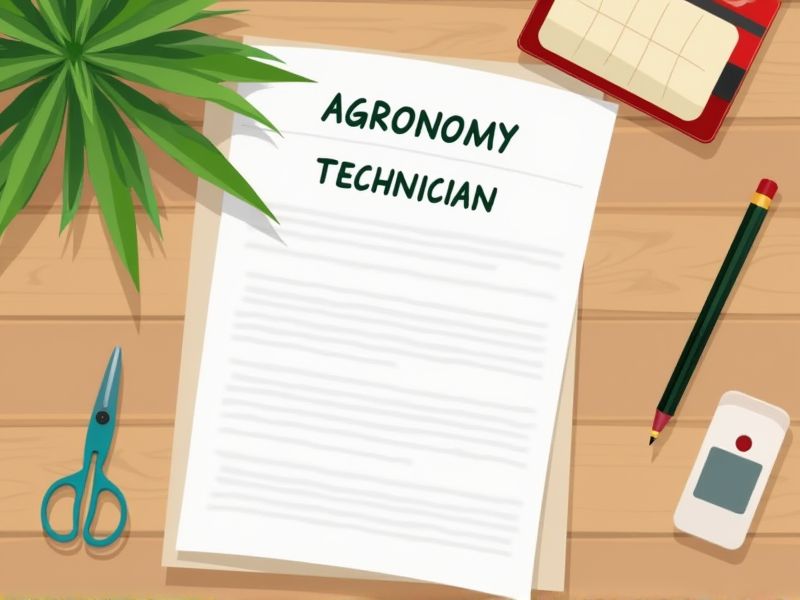
Agronomy Technicians require a deep understanding of soil science, crop management, and environmental sustainability, all of which necessitate specialized skills. Certifications validate expertise in these areas, ensuring technicians can effectively implement agricultural practices and enhance crop production. Employers often prefer certified technicians, as it reduces the risk of errors and increases operational efficiency. These are some critical certifications you might need for a career as an Agronomy Technician.
Certified Crop Adviser (CCA)
Certified Crop Advisers (CCA) play a critical role by bringing specialized knowledge of crop management practices, enhancing decision-making for agronomy technicians. CCA certification ensures that agronomy technicians receive guidance based on the latest research and industry standards. Working with a CCA improves crop productivity and environmental sustainability by applying targeted interventions. A CCA also helps agronomy technicians navigate complex regulations and compliance issues, reducing risks for agricultural operations.
Pesticide Applicator Certification
Pesticide Applicator Certification ensures that agronomy technicians are knowledgeable about safe and effective pesticide use. This certification reduces the risk of environmental contamination and harm to non-target organisms. By being certified, technicians demonstrate compliance with regulatory standards, minimizing legal and financial liabilities for employers. Certification helps maintain public trust in agricultural practices by assuring consumers of responsible pest management.
Integrated Pest Management (IPM) Certification
Integrated Pest Management (IPM) Certification equips agronomy technicians with strategies to effectively control pests while minimizing environmental harm. Certification ensures technicians are knowledgeable about sustainable practices, aligning with consumer demand for eco-friendly agricultural products. Certified technicians reduce reliance on chemical pesticides, promoting biodiversity and safeguarding beneficial organisms. The certification enhances job prospects and credibility, as it demonstrates a commitment to responsible pest management approaches.
Soil Science Certification
Soil science certification equips an agronomy technician with comprehensive knowledge about soil health, crucial for effective crop management. This certification enhances credibility, providing assurance to employers and clients regarding the technician's proficiency in soil analysis and its impact on crop yields. Access to certified industry standards and practices improves decision-making processes, directly benefiting agricultural productivity. Certification fosters continuous learning, keeping the technician updated with the latest advancements in soil science, which contributes to innovative solutions in agronomy.
Agricultural Safety Certification
Agricultural safety certification is crucial for agronomy technicians as it reduces the risk of accidents and ensures compliance with safety regulations. Certification programs provide essential knowledge on handling hazardous materials, which can minimize potential environmental damage. A trained technician contributes to the safe and efficient operation of agricultural machinery, preventing costly downtime. Certified professionals are often more trusted by employers, leading to increased job opportunities and career advancement.
GIS Mapping Certification
GIS Mapping Certification equips agronomy technicians with the skills to analyze spatial data effectively, leading to optimized resource management. With this certification, technicians can accurately assess soil quality and crop yields, improving the precision of agricultural practices. It enables better decision-making by providing detailed visualizations of land use and environmental conditions. Enhanced GIS capabilities result in increased productivity and sustainability in agricultural operations.
Sustainable Agriculture Certification
Sustainable Agriculture Certification enhances the credibility of agronomy technicians by aligning their practices with environmental and social standards. Certification often leads to better resource management, reducing input costs and improving yield outcomes. Consumers increasingly demand sustainably produced food, so certified technicians can meet market needs and boost a farm's marketability. Certifications equip technicians with advanced knowledge that can drive innovation and efficiency in agricultural practices.
Precision Agriculture Certification
Precision agriculture certification equips agronomy technicians with the skills to use advanced technologies for crop monitoring. This expertise enables them to make data-driven decisions, improving crop yields and reducing resource waste. Enhanced proficiency in these technologies also opens up new job opportunities and advancements within the agricultural sector. Certification assures employers of the technician's capability to adapt to rapidly evolving agricultural practices.
Farm Management Certification
Farm Management Certification provides crucial knowledge that enhances an agronomy technician's ability to optimize resource allocation on farms. Trained technicians can effectively manage crop production cycles and improve yield quality and quantity. Certified knowledge in farm management also ensures that technicians can implement sustainable practices, reducing environmental impact. Technicians with this certification are often better equipped to comply with agricultural regulations, thus avoiding legal issues for farming operations.
Environmental Compliance Certification
Environmental Compliance Certification is necessary for agronomy technicians to ensure they adhere to regulations that protect ecosystems and maintain biodiversity. This certification helps prevent harmful agricultural practices that could lead to soil degradation and water contamination. Compliance fosters trust and accountability between agronomy professionals and regulatory bodies, ensuring sustainable agricultural production. Certified technicians are better equipped to implement eco-friendly practices, promoting long-term environmental health.
Summary
When you obtain certifications as an Agronomy Technician, it enhances your knowledge and expertise in crop science and soil management. You are better positioned to improve crop yields and implement sustainable farming practices effectively. Your qualifications can lead to greater job opportunities and career advancement in the agricultural sector. Certification validates your skills, making you a more credible and trusted professional in agronomy.
